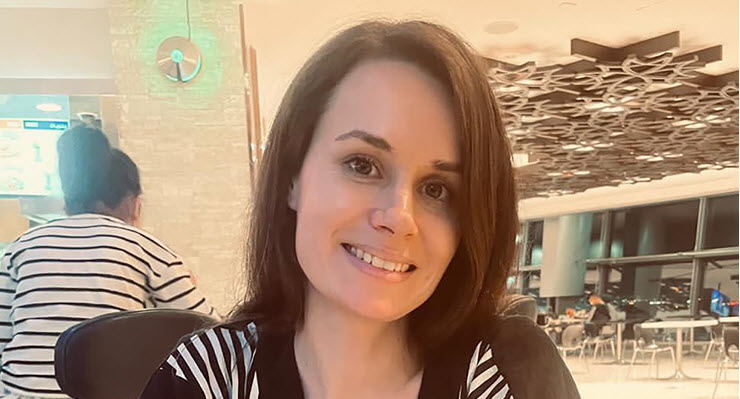
British-Australian academic Dr Kylie Moore-Gilbert, who spent 804 days in an Iranian prison, has criticised the Australian government for its lack of strategy around hostage negotiations, arguing the Department of Foreign Affairs and Trade is overburdened and ill-equipped to deal with those detained abroad.
“Navigating this strategic minefield is a task beyond both the capabilities and the remit of the DFAT,” she said. “Australia needs a clear and sensible strategy. Right now we have none.”
Speaking at a “Sydney Ideas” event at the University of Sydney last night, Moore-Gilbert said DFAT was underfunded and under-resourced, meaning it was unable to offer “more than the most basic consular assistance in most cases”.
The department had nearly 1000 jobs cut under the Coalition — a hollowing out which may take two to three terms of government to staff it at appropriate levels.
Her comments came the same day Australian economist Professor Sean Turnell was sentenced to three years in prison in Myanmar after a secret trial. Turnell was an economic adviser to deposed leader Aung San Suu Kyi and was detained in February last year after the military overthrew Suu Kyi’s government.
“We need to be prepared to punish hostage-taking states, including making robust use of Magnitsky sanctions without being perpetually hamstrung by fears of upsetting diplomatic relationships,” Moore-Gilbert said.
“After all, is not imprisoning innocent citizens of Australia for diplomatic leverage not firing the first shot in an assault on our bilateral relationship? We should not be afraid of firing back.”
Magnitsky-style sanctions, named after Russian lawyer Sergei Magnitsky who was killed in 2009 after exposing serious tax fraud by several Russian companies confiscated from an American financier, enable governments to impose economic sanctions for perpetrators of serious human rights violations and abuses abroad. After being enacted into law in December last year, they’ve been used only once, implementing travel bans and freezing the assets of 14 Russians involved in Magnitsky’s maltreatment.
They haven’t been used in Turnell’s case, though there are hopes his sentencing could trigger a deportation process.
Along with punitive action for nations that hold Australian hostages, Moore-Gilbert also called for more “compassion, as well as common sense” when dealing with victims and their families. She said the department had an “almost paranoid” aversion to the media, keeping both the public and families in the dark about progress on negotiations.
“Family members whilst being told very little [were] oppressed into silence, using the very effective threat of if you speak out … you will endanger [your loved one] in prison,” she said.
Journalist Peter Greste, who was sentenced to several years’ jail in Egypt in 2013, has repeatedly said public attention can help hostages by putting a spotlight on their treatment.
Moore-Gilbert said that when she returned to Australia, there was no debriefing, support medical exam or psychiatric evaluation — all of which may have helped her reintegrate into society. While the US has a special presidential envoy for hostage affairs which communicates with victims and their families, no such position exists in Australia.
“The buck must stop with someone who is both approachable and accountable,” she said.
Foreign Affairs Minister Penny Wong has been contacted for comment.








Interesting but who needs DFAT when we have CIS Centre for Independent Studies being the self, LNP and media appointed ‘go to experts’ on foreign policy?
Seriously, the diplomatic side is important but the consular or ‘public facing’ side has also been hit, but ameliorated by digital telecommunications and diaspora abroad in assisting individuals wherever they are in trouble; visas, passport etc. can be processed by teams based anywhere.
Further, does a diplomatic presence on the ground always translate into DFAT and/or public support, with publicity in the media?
Given that the ASPI runs our Dept of War…sorry Defense, via Langley VA, it seems par for the course, entirely appropriate.
PS – congrats for not mentioning Koch, white nativism etc, hope it wasn’t too painful.
CIS is in the Atlas or Koch Network 🙂
Of course ASPI have influence, being a government NGO or Quango, amongst many other right wing influencers.
Here you go, US based Atlas (Koch Network) Global Directory for Oz/NZ (IPA, CIS, Taxpayers’ Alliance etc.), via the WayBack Machine archives, why archived? For some reason the Atlas directory links were removed in 2021, hindering research.
https://web.archive.org/web/20210507170634/https://www.atlasnetwork.org/partners/global-directory/australia-and-new-zealand
Can Ms Moore-Gilbert clarify if that is her in the widely published picture of purportedly her and other women wearing military fatigues whist she was in Israel?
I think DFAT has spent so much time chasing bullshit free trade agreements that they have forgotten what the Foreinbg Affairs side looks like. The fault lies almost entirely with the LNP. But Australians have paid a high price for DFAT’s gutting and the cowardice of the LNP in anything other than China bashing. I am an oldish man, one of my classmates was Sir Richard Woolcott’s son and I cannot conceive of such uselessness during the reign of Woolclip (as we called Peter) senior.
Any Australian government agency ever helping an Australian in need overseas would be a “world first” I guess, as the abandonment of Australians stranded overseas during COVID has demonstrated so clearly.
For Kylie, marrying an Isreali spy was not a good move. Then heading to Iran to foment revolution for him was really asking for trouble. Then to eventually get back to Oz and find him shagging her Spy Boss showed what a quality guy she picked. Hope Kylie makes much better choices from now on. And stops blaming DFAT for her bad decisions.